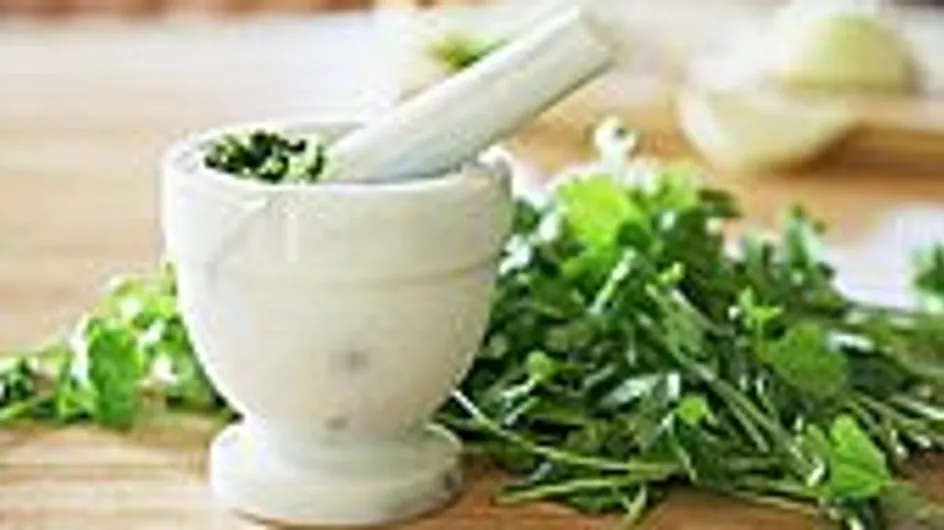Nutritional focus
Aromatic herbs are generally full of vitamins, notably Vitamin C and minerals (iron, magnesium, phosphorous, calcium). As they are extremely low in calories, they are an ideal ally for healthy recipes, bringing out the flavour of any dish that may be a little dull. The presumed virtues of these herbs are numerous and a lot among them are used as herbal teas or for garnishing, such as mint, thyme and aniseed.
Cooking herbs
Aromatic herbs are very fragile and don’t stand up to heat very well: it destroys their aromas. To preserve your herbs, it’s better to avoid cooking them! Add herbs to your dishes off the heat or at the very end of cooking.
The most commonly-used herbs
Parsley
The best known herb, curly parsley is not very strong but makes a pretty garnish. It resists heat better than flat leaf parsley, which is a lot more flavoured and is eaten raw. It is used in bouquet garni, salads and to accompany vegetables and tomatoes, plus it goes well with fish and fruit.
Thyme
One of the most flavoursome herbs, thyme needs heat to release its aroma so you need to cook it. It accompanies marinades marvellously as well as stuffing, meat, fish, vegetables, fruit and cheese. You can also add it to pasta to add flavour. Thyme is said to have many antiseptic properties.
Chives
Also very popular, chives have a particular freshness, and their subtle flavour make them ideal with eggs (omelette for example), fresh cheese, fish and vegetables. Chives go well with poultry and raw red meat and are essential for vinaigrettes. They don't resist heat well, so add them at the end of cooking, off the heat. Try using them with fruit as well to create original flavours!
Dill
The ideal partner for fish, dill has a very particular aniseed taste that isn't to everyone's taste. It brings out all the flavour of cream-based dishes. It also doesn’t stand up well to heat, so don't cook it for a long time or mix it with hot condiments such as garlic. In Scandinavian countries, where it originates from, dill is used to season salads, marinades and meat balls. Experiment with it!
Basil
The taste of Italian cuisine, basil goes with garlic, olive oil and lemon perfectly, but is also delicious with summer vegetables, fresh cheese, meat (raw and cooked), eggs, fish and fruit. Try using it with apricots or strawberries to enhance their flavour. The only disadvantage of basil is its size and its fragility: it does not resist heat well (it must be added at the very end of cooking, off the heat), and once picked, it doesn’t keep well. This is why it is often transformed into pesto, a mix of basil and olive oil used to accompany pasta and flavour soup. Did you know that basil repels mosquitoes?!
Mint
Also very well known, mint is used for its fresh taste. Regular or peppery mint is widely used in desserts to boost the flavour of chocolate, citrus fruit and tropical fruit. It's also good with goat’s cheese, yoghurt, fresh cheese and savoury dishes. Try with lamb and rabbit, for example. But take care not to overdo it as mint can be very strong. Peppery mint is an excellent antiseptic and antispasmodic.
Sorrel
Lemony and quite sour, sorrel is ideal for cooking with poultry, eggs and fish, but it can also be eaten as a vegetable (just cook it like spinach). Use it to stuff meat and fish: it will soften the meat and the fish bones. But only use stainless steel utensils when you prepare it, as sorrel stains.
Tarragon
Its strong flavour is lovely with fish and poultry and in sauces. Tarragon is one of the rare herbs that handles heat well. Use it in your stuffing or marinades too. Tarragon loses its flavour when it dries out, so best to use it fresh or frozen.
Garlic
You can’t do without garlic in the kitchen. Its strong flavour enhances all dishes such as meat, stuffing and vegetables. Garlic handles heat very well and strengthens its taste when cooked, but loses its flavour if you cook it for too long. The shoot is not digested well so make sure you remove it. Garlic is also a proven antiseptic and antibacterial agent.
Other herbs
Aniseed, camomile, caraway, chervil, lemon grass, coriander, shallots, fennel, lavender, laurel, marjoram, bee balm, oregano, rosemary, sage, marigold, valerian and verbena.













